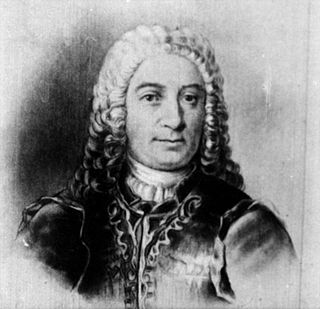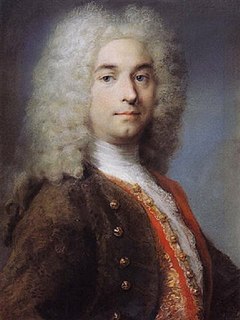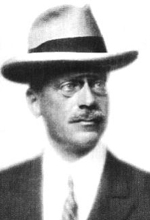 W
WPierre-Augustin Caron de Beaumarchais was a French polymath. At various times in his life, he was a watchmaker, inventor, playwright, musician, diplomat, spy, publisher, horticulturist, arms dealer, satirist, financier, and revolutionary.
 W
WNicolas Béhuchet, also known as Colin Béhuchet, was a French admiral and financier. Together with Hugues Quiéret, he commanded the French fleet during the early phases of the Hundred Years' War. At the battle of Arnemuiden in 1338, Béhuchet ordered the English prisoners massacred. The following years, he and Quiéret fought the English in the Channel. Two years after Arnemuiden, the French fleet was anchored at Sluys in preparation of an invasion of England. The fleet was attacked by Edward III's English fleet and was destroyed in the battle of Sluys. After this defeat, the captured Béhuchet was hanged as a revenge for the massacre at Arnemuiden.
 W
WSamuel Bernard, Count of Coubert (1725), was a French noble and financier.
 W
WStéphane Christophe Bridé was the Deputy Prime Minister and Minister of Economy of Moldova between 18 February 2015 and 20 January 2016. He is a French citizen who has held dual Moldovan/French nationality since 26 December 2013. He has more than 20 years experience working as an accountant, auditor and consultant in management and fiscal policy.
 W
WCharles Aubert de La Chesnaye was a French businessman active in Canada. The richest financier and businessman in New France, he played an important part in the colony's economic life, owned several seigneuries and was a member of the Sovereign Council of New France. In 1682 he founded the Compagnie du Nord to compete with the Hudson's Bay Company. He has been called "the principal businessman and the greatest landowner of the colony". Several places in the Quebec province and Quebec City are named after him and in 1971 he was made one of Canada's Persons of National Historic Significance. His descendants include the writer Philippe-Joseph Aubert de Gaspé.
 W
WÉtienne Clavière was a Genevan-born French financier and politician of the French Revolution.
 W
WPierre Crozat (1665–1740) was a French financier, art patron and collector at the center of a broad circle of cognoscenti; he was the brother of Antoine Crozat who, for a 15 year period, had sole authority over the African slave trade.
 W
WAuguste Dreyfus was a French businessman who made his fortune by financing the Peruvian trade in guano. Dreyfus joined a small textile trading firm set up by three of his elder brothers and moved to Lima, Peru to act as their local representative. He became involved in the guano trade, and in 1869 signed a major contract with the Peruvian government that gave him a monopoly over exports of Peruvian guano to Europe. With this he controlled the largest source of Peruvian national income.
 W
WArmand Joseph Dubernad was born 23 November 1741, in Bayonne. He died 9 May 1799, in Morlaix.
 W
WAchille Fould was a French financier and politician.
 W
WCharles Gabriel Le Bègue de Germiny was a French financier and politician. He was Minister of Finance during the French Second Republic, and governor of the Banque de France.
 W
WLaurent Grimod de La Reynière was a French financier and fermier général. He was the son of Antoine-(Gaspard) Grimod, seigneur de La Reynière, another fermier général, and his third wife Marie-Madeleine Mazard, of whom a pastel portrait was executed by Maurice-(Quentin) de La Tour in 1751.
 W
WCornelius Herz was born in Besançon, France on September 3, 1845, and he died in Bournemouth, England on July 6, 1898. He was a French-American doctor, electrician, businessman and famous politician of Jewish German descent, implicated in the Panama scandals.
 W
WOctave Marie Joseph Kérim Homberg, Jr. was a French diplomat, author, and financier. He was director of the Indo-China Bank.
 W
WJean-Georges Humann was a French financier and politician. During the July Monarchy (1830–1848) he was several times Minister of Finance.
 W
WDaniel Iffla known as Osiris was a financier and philanthropist.
 W
WAndré-Daniel Laffon de Ladebat was a French financier, politician and philanthropist.
 W
WAnge-Laurent de La Live de Jully was an 18th-century French financier and patron of arts.
 W
WCharles François Paul Le Normant de Tournehem (1684–1751) was a French financier, a fermier-général, or tax-farmer.
 W
WJoseph Dominique, baron Louis, French statesman and financier, was born at Toul (Meurthe).
 W
WNicolas François, Count Mollien, was a French financier. The son of a merchant, he early showed ability, and entered the ministry of finance, where he rose rapidly; in 1784, at the time of the renewal of the arrangements with the tax-farmers-general, he was practically chief in that department and made terms advantageous to the national exchequer.
 W
WGabriel-Julien Ouvrard was a French financier who was born in Moulins d'Antières at Cugand (Vendée) on 11 October 1770 and who died in London in October 1846.
 W
WJean Pâris de Monmartel was a French financier. He was the youngest of the four Pâris brothers, who were financiers under Louis XIV and Louis XV. At the height of his fortunes he had 370,000 livres invested in the powerful Société d'Angola, set up to deal in the Atlantic slave trade, managed by Antoine Walsh, the richest and most famous of the Irish of Nantes.
 W
WJoseph Pâris dit Duverney or Joseph Pâris Du Verney was a French financier.
 W
WÉmile Pereire and his brother Isaac Pereire were major figures in the development of France's finance and infrastructure during the Second French Empire. The Pereire brothers challenged the dominance of the Rothschilds in continental European finance, known at the time as haute finance. Their attempt was temporarily successful, and even though it collapsed in the late 1860s, it contributed to a more developed and vibrant economic landscape. Like the Rothschilds, the Pereires were Jews, but unlike them, they were Sephardi of Portuguese origin.
 W
WEugène Péreire was a French financier and politician of Sephardic Jewish origin. The son of Isaac Péreire of the prominent Péreire brothers, he founded Banque Transatlantique in 1881.
 W
WYves Perrier is a French financial manager. He served as chief executive officer (CEO) of Amundi from the creation of the company in 2010 to 2021.
 W
WMayer Alphonse James Rothschild, was a French financier, vineyard owner, art collector, philanthropist, racehorse owner/breeder and a member of the Rothschild banking family of France.
 W
WÉdouard Alphonse James de Rothschild, also known as Baron Édouard de Rothschild was an aristocrat, French financier and a member of the prominent Rothschild banking family of France.
 W
WMaurice Edmond Karl de Rothschild was a French art collector, vineyard owner, financier and politician. He was born into the Rothschild banking family of France.
 W
WAntoine Sartine (1681–1744), later known as Antonio de Sartine, was a French-born financier and Spanish administrator.
 W
WAdolphe Schneider was a French financier and industrialist who developed a major metalworking enterprise at Le Creusot, the parent of today's Schneider Electric.
 W
WJacques P. Schneider was the French financier, balloonist and aircraft enthusiast, who created the Schneider Trophy.
 W
WSerge Alexandre Stavisky was a French financier and embezzler whose actions created a political scandal that became known as the Stavisky Affair.
 W
WPaul Loup Karl Sulitzer is a French financier and author. Before he turned seventeen, he was already a self-made millionaire. Sulitzer used his financial experience and knowledge in his books, which often related to the business world.
 W
WPhilippe Wahl is a French business executive. Having previously been a government advisor and bank executive, in September 2013 he was appointed president and chief executive officer of La Poste, the group which includes the French postal service.